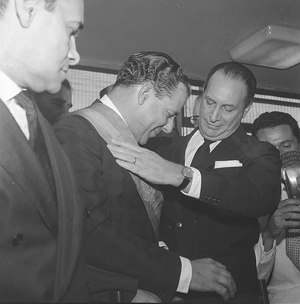
Back حملة الشرعية Arabic Campaña de la Legalidad en Brasil Spanish Campagne pour la légalité French Campanha da Legalidade Portuguese
| Legality Campaign | |||
|---|---|---|---|
| Part of the Fourth Brazilian Republic | |||
 7 September: João Goulart takes the presidential sash as a result of the campaign | |||
| Date | 25 August – 7 September 1961 | ||
| Location | |||
| Caused by | Resignation of president Jânio Quadros Military ministers' veto on vice president Goulart's inauguration | ||
| Goals | To comply with the presidential line of succession | ||
| Methods | Demonstrations Strikes Media campaigns Military operations | ||
| Resulted in | Inauguration of Goulart Installation of the parliamentary regime | ||
| Parties | |||
| |||
| Lead figures | |||
The Legality Campaign (Portuguese: Campanha da Legalidade; also known as Legalidade) was a civil and military mobilization in 1961 to ensure the inauguration of João Goulart as President of Brazil, overturning the veto of the Armed Forces' ministers to the legal succession of president Jânio Quadros, who had resigned, to then vice president Goulart. It was led by the governor of Rio Grande do Sul, Leonel Brizola, allied with the commander of the 3rd Army, general José Machado Lopes. The crisis resulted in the adoption of parliamentarism as Brazil's new system of government.
On 25 August 1961, while Goulart was leading a Brazilian trade mission to the People's Republic of China, president Jânio Quadros resigned. Quadros' decision is still not understood, but it was probably a political maneuver to return to the presidency with increased powers, overcoming the political impasse he had with Congress. Quadros expected that, with the rejection to his vice president – elected from a different ticket, due to a peculiarity of the political system at the time – the anti-communist military, which had already rejected Goulart, together with popular pressure, would reverse the resignation. However, the maneuver failed and Quadros left the country. The president of the Chamber of Deputies, Ranieri Mazzilli, took his place temporarily, but the real power remained in the hands of the military ministers, marshal Odílio Denys, minister of war, vice admiral Sílvio Heck, minister of the Navy, and air brigadier Gabriel Grün Moss, minister of the Air Force. Constituting in practice a junta, the three ministers broke the legal order and vetoed the vice president's inauguration, demanding that new elections be held. This veto is characterized as an attempted coup d'état by several historians.[a]
Carlos Lacerda, governor of Guanabara, agreed with the veto, but the ministers did not have enough support in society and the Armed Forces, encountering opposition in demonstrations, strikes and the positions of political figures and organizations. The governors of Goiás, Mauro Borges Teixeira, and Rio Grande do Sul, Leonel Brizola, joined the cause of presidential succession according to the Brazilian Constitution of 1946. Brizola mobilized the population, the Military Brigade of Rio Grande do Sul and radio stations, creating the "Legality Chain" to dominate Brazil's public opinion.
The 3rd Army, headquartered in Porto Alegre, came to the brink of confrontation with the state government, but on 28 August, general Machado Lopes broke with his superiors and turned the powerful land force in the south of the country over to the legalist side. Southern legalists and forces loyal to the military ministers prepared military operations against each other. On one side, troops moved to the southern coast and the northern border of Paraná, and on the other, a land invasion force was formed against the south, the "Cruzeiro Division", and a naval task force headed by the aircraft carrier Minas Gerais. The military was divided, and morale for an invasion against the south was limited. The crisis thus brought the country to the brink of civil war.[b]
Before any confrontations took place, a conciliatory solution was devised: the adoption of parliamentarianism, which would allow Goulart to take office, but with limited powers. Arriving in Brazil via Porto Alegre on 1 September, Goulart's last obstacle was the plan by dissatisfied officers to shoot down his plane as he flew to Brasília, Operation Mosquito, but he managed to take office on 7 September, completing the campaign's goal. Parliamentarianism was reversed in 1963.
The crisis caused by Jânio Quadros' resignation and the veto to legal succession of João Goulart are among the crises of the Fourth Brazilian Republic that preceded the 1964 coup d'état, along with 1954 (the end of Getúlio Vargas' government) and 1955 (the succession of Juscelino Kubitschek, guaranteed by the 11 November movement).[c] The 1961 crisis precedes the 1964 coup and is even called its "dress rehearsal".[d]
Cite error: There are <ref group=lower-alpha> tags or {{efn}} templates on this page, but the references will not show without a {{reflist|group=lower-alpha}} template or {{notelist}} template (see the help page).